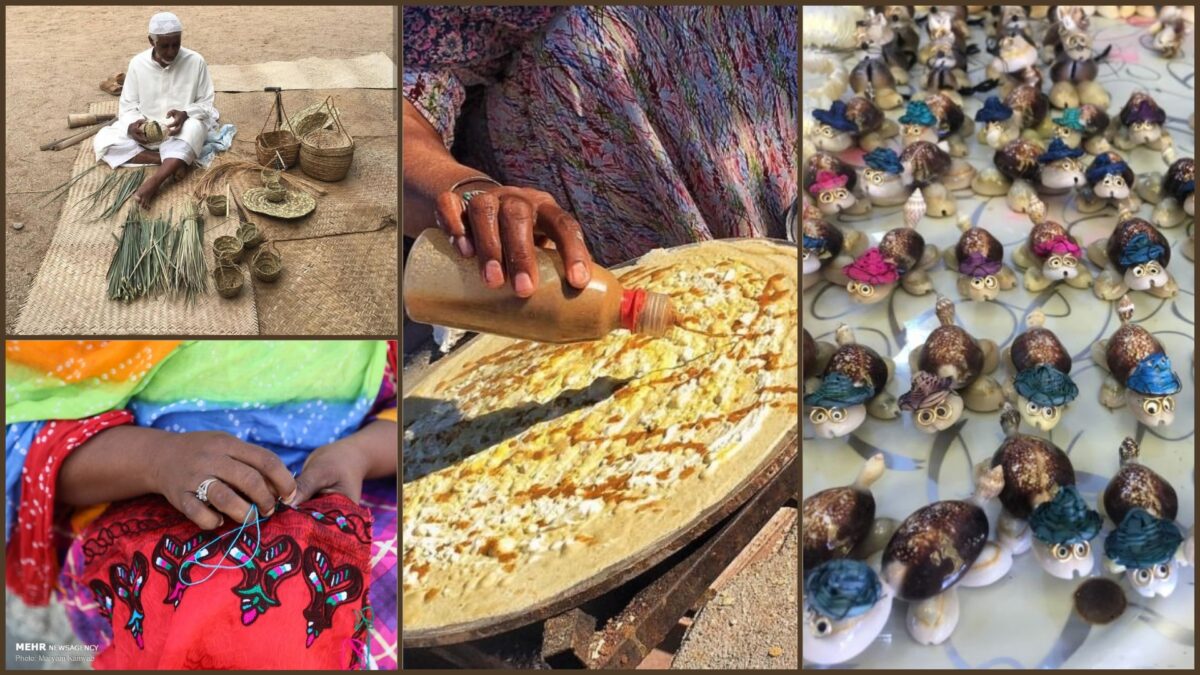In addition to the fascinating nature of the Global Geopark of Qeshm Island and its historical sites, food and crafts make the trip to the island in the Persian Gulf more joyful.
Qeshm’s souvenir and handicraft world is full of colourful, vibrant food and hand-made structures that add to the wonder of traveling to the Island.
Qeshm’s Famous Dishes
Variety of local breads, dates, and delicious spices from the red soil of Hormuz Island have delicious flavours. Cakes and southern Masghati are some of the popular dishes of Qeshm Island.
Local Breads of Qeshm
Everywhere in Qeshm, you can see women preparing bread. These breads are of different types and various spices and sauces are used to cook them. Tomshi is one of them; a type of thin bread that is prepared with eggs, cheese, Mahyaveh or Souragh. Mahyaveh is a sauce made from sardines and Souragh is a sauce in which the red soil of Hormuz Island is used as a spice. Cheese bread is another bread most commonly found in shops. This bread is eaten in Qeshm at breakfast and has a pleasant taste.
Heller Cake
Heller is the name of a sponge cake made using flour, eggs, sugar and vanilla. This souvenir is found in Qeshm’s pastry shops. However, its different flavours have led people and tourists to believe that it won’t be found anywhere else.
Southern Masghati
The combination of starch, rose water, saffron, nuts, butter, etc. makes a delicious pastry called Masghati. In Iran, of course, there is another type of Masghati which is the souvenir of Shiraz.
Qeshm Handicrafts, Souvenirs
Handicrafts on Qeshm Island are categorised into different types. Shell handicrafts, traditional sewing for decorating textiles, mat textures with native plants, and native musical instruments are among the industries in the area. The most famous industry of the region is Launch-building which UNESCO has registered as the intangible cultural heritage of Qeshm. Each of these crafts is unique in its own way and belongs to this region of the Persian Gulf.
Shell Handicrafts
This group of Qeshm handicrafts includes mussel jewelry such as necklaces, bracelets, earrings, sculptures or decorations for mirrors, bags, and more.
Traditional Sewing Types
The other group of Qeshm handicrafts are traditional sewing and textile decorations on clothes, bags and shoes, jewelry, etc. Like Golabetoun Doozi, Shak-weaving, Zaribafi, Khoos-Doozi, etc.
Golabetoun-Doozi
In the art of Golabetoun-Doozi, ancient Iranian motifs such sit on fabric with gold and silver threads and they decorate pants, scarves and women’s clothing with it.
Shakbafi
Women and girls weave strips of 5 to 50 mm in diameter using a small cushion and several spools. These strips are of great value and are sewn on pants, sleeves and collars and skirts. One of the reasons for the high cost of southern clothes and their value is these strips. If golden thread is added to this type of weaving, it is called Zarifbafi instead of Shakbafi.
Traditional Clothing and Fabrics of Qeshm Island
One of the women’s traditional clothes in Qeshm Island is their special Burqas or scarves that come in many different types. Burqas are available in a variety of colours, from red and green to black and typically cover the top of the eyebrows to the nose. Jelopol is also a cover for Qeshm women that is very thin and they wear Chador over it.
Mat-weaving with Native Plants of Persian Gulf
In addition to products such as mat and baskets, which are available to tourists using various plant fibers on the island, there is some kind of flooring or roofing in the area Sondbafi. Qeshm men and women bring palm tree shrubbery and use them in a variety of ways, including flooring, roofing, or wooden bedding. This is called Sondbafi.
Kapkaap-Making
The hot weather in Qeshm Island cannot be tolerated in the warm seasons. Fishermen and Launch-makers work in the heat and put their feet on the ground. To solve this problem, Kapkaap was formed. It is a sandalwood-like shoe, which is sometimes made with extra wood in Launch-making workshops. These days, it is one of the most important industries and souvenirs of Qeshm.
Oud-Making
The oud is a short-neck lute-type, pear-shaped stringed musical instrument. The oud, known in Farsi as Barbat, is a historical instrument that has a sombre and eerie sound. This instrument is a bit like Tar and Setar, but with different dimensions and is very much used in traditional Iranian music. The art of Oud-making has been prevalent on the island of Qeshm for years and is one of the most original indigenous arts in the region.
Launch-Making and Net-Knitting
Launch is a small ship or large boat that is most commonly found in the Persian Gulf, the Oman Sea and the Indian Ocean. The Iranians skill of launch-making is registered as a UNESCO intangible heritage and a world heritage. Knitting the fishing net or producing Gregor is another industry that Qeshm is are involved in.
